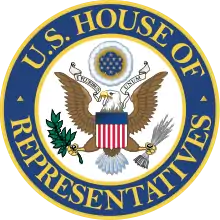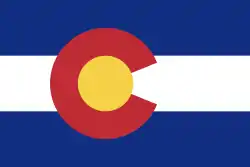Hosea Townsend
Hosea Townsend (June 16, 1840 – March 4, 1909) was an attorney and a U.S. Representative from Colorado.[1] Appointed by Presidents McKinley and Roosevelt, he was a United States judge for the southern district of the Indian Territory from 1897 to 1907.
Hosea Townsend | |
|---|---|
.jpg.webp) | |
| Member of the U.S. House of Representatives from Colorado's at-large district | |
| Preceded by | George G. Symes |
| Succeeded by | District inactive |
| Military service | |
| Allegiance | |
Early life and education
Born on a farm in Greenwich, Ohio, his parents were Hiram and Eliza Townsend.[2][3] His father came to New London, Ohio from Massachusetts in 1816.[4] Townsend attended the common schools and Western Reserve College, Cleveland, Ohio, in 1860.[1]
Civil War
He was a student at the Western Reserve College at the outbreak of the American Civil War.[2] He enlisted in the Second Regiment, Ohio Volunteer Cavalry, in 1861. He was promoted to lieutenant.[1] He was stationed at Fort Gibson in Indian Territory during part of the war.[3] He contracted a case of typhoid fever and resigned in 1863 due to a disability.[1][3]
Career
He studied law and was admitted to the bar in Cleveland, Ohio, in 1864[1] or 1865.[2][3] He began practicing law in Memphis, Tennessee in 1865.[1] He served as member of the State house of representatives in 1869.[1] He practiced law in Memphis until 1881.[3]
He moved to Colorado in 1879 and settled in Silver Cliff in 1881.[1] He made and lost a fortune in the mining business.[2] Townsend was elected as a Republican to the Fifty-first and Fifty-second Congresses (March 4, 1889 – March 3, 1893). He was an unsuccessful candidate for renomination in 1892. He served as delegate to the Republican National Convention in 1892.[1] He was a United States judge for the southern district of the Indian Territory from 1897 to 1907.[1] He served on the Court of Appeals.[3] He was first appointed by President William McKinley and he was re-appointed by President Theodore Roosevelt in 1902 and 1906.[5] Oklahoma achieved statehood in 1907 and the Indian Territory court was closed.[2] He remained in Ardmore and practiced law.[2]
Townsend had a forceful personality. In one case, a Seventh Day Adventist refused to perform jury duty on a Sunday, and Townsend found him in contempt of court. He discharged a jury that returned a verdict with which he disagreed saying it was "discharged for the term, and I never want to see any of you in my court again." Yet he extended leniency to a bootlegger whose family needed him at home to keep food on the table.
— Von Russell Creel[2]
Personal life
He married Anna Augusta Barnes on November 28, 1865[4] and they had two children, John Barnes Townsend and Anna Bell Townsend.[3][4] After they moved to Ardmore, Oklahoma of the Indian Territory, Anna decided that the area needed a library and obtained funding from Andrew Carnegie about 1903. The Ardmore Carnegie Library was opened on October 1, 1906. Anna and Hosea donated 800 books for the library.[5]
He died in Ardmore, Oklahoma on March 4, 1909. He was interred in Woodlawn Cemetery, Norwalk, Ohio.[1] Anna died in 1915.[5]
References
-
- United States Congress. "Hosea Townsend (id: T000334)". Biographical Directory of the United States Congress.
 This article incorporates public domain material from the Biographical Directory of the United States Congress website http://bioguide.congress.gov.
This article incorporates public domain material from the Biographical Directory of the United States Congress website http://bioguide.congress.gov.
- United States Congress. "Hosea Townsend (id: T000334)". Biographical Directory of the United States Congress.
- Creel, Von Russell. "Townsend, Hosea". The Encyclopedia of Oklahoma History and Culture. Retrieved February 4, 2020.
- Green, Edward Bell; Dale, Frank; Burford, John Henry; Williams, Robert Lee; Kane, Matthew John; Parker, Howard J.; Eaton, Charles Winfield Van; Morgan, Nell C. (1910). Oklahoma Reports: Cases Determined in the Supreme Court of the State of Oklahoma. Harlow publishing Company. pp. v–xiv.
- The Firelands Pioneer. The Society. 1907. p. 1627.
- "Anna Barnes (Mrs. Hosea) Townsend - Oklahoma Library Association". www.oklibs.org. Retrieved February 4, 2020.
External links
| U.S. House of Representatives | ||
|---|---|---|
| Preceded by George G. Symes |
Member of the U.S. House of Representatives from Colorado's at-large congressional district 1889–1893 |
Succeeded by District inactive |


